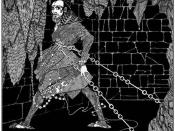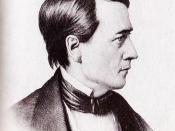Is pride beneficial? At what point does pride become destructive? In the three short stories, "The Lesson", "The Cask of Amontillado", and "The Scarlet Ibis," each protagonist displays a sense of pride and confidence in their actions. Sylvia of Toni Cade Bambara's "The Lesson", is brought to a toystore by Miss Moore, an educated neighbor. She realizes that the only people who can afford to pay the outrageous prices on toy boats and clowns are successful people, and she resolves to be a part of that success. In "The Cask of Amontillado" by Edgar Allen Poe, Montresor is insulted by Fortunato, and he sets a trap for his transgressor, taking his revenge in murder. The narrator of "The Scarlet Ibis" by James Hurst, recalls a time when he attempted to teach his crippled, invalid brother, Doodle, to walk, but pushed him too far and killed him.
The actions of these characters are driven by pride, which proves to be either beneficial or destructive.
In "The Lesson", Sylvia struggles to overcome obstacles presented by social inequality. When she and her friends are bought to an upscale toystore, they are forced to come to the realization that as uneducated blacks, they are at a disadvantage. Where most of Sylvia's friends are in awe of the toys, Sylvia herself is mostly ashamed to know her family would never be able to "spend on a toy what it would cost to feed a family of six or seven." (223) A bit of anger on the part of Sylvia at this injustice can also be seen when she and her friends are marveling at the price on the fiberglass boat; she says, "We just stare at that price tag. Then Sugar run a finger over the whole...


